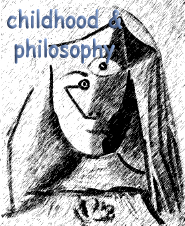the child and the p4c curriculum
DOI:
https://doi.org/10.12957/childphilo.2020.46769Keywords:
philosophy and childhood, cartesian modernity, qualitative thought, dewey, lipman.Abstract
In this paper I take my cue from what I suggest calling “the Adamitic modernity.” By this phrase I endeavor to capture a specific ‘removal’ of childhood that occurs in the Cartesian gesture of the enthroning of Reason. By drawing upon a reading of the major philosophical works of Descartes, I will argue that one of the main thrusts of his conceptual device is a deep-seated, and even anguished, mistrust of childhood and its errors. To put it in a nutshell: in the Cartesian modernity philosophy/science and childhood are at odds with each other. In the second step of my argumentation, I will show in what sense Dewey rehabilitates childhood and its form of experience by, thus, healing the rift between childhood and science (as his notions of inquiry and qualitative thought prove). This notwithstanding, Dewey was not ready to take the decisive step of thinking of a philosophy for children. Precisely by activating and developing the significance of qualitative thought, Matthew Lipman was able, instead, to progress beyond Dewey. In this perspective, I will show how Lipman and Ann Sharp, while walking in Dewey’s footsteps as far as their non-Cartesian interpretation of childhood is concerned, part company with him in their educational take on philosophy and on how this results in a revamping of the way of construing the Deweyan relationship between the child and the curriculum.
Downloads
References
Alquié, F. (1950). La découverte métaphysique de l’homme chez
Descartes. Paris: Press Universitaires de France.
Author (2012). REDACTED FOR BLIND REVIEW.
Author (2015). REDACTED FOR BLIND REVIEW.
___ & Author (2012). REDACTED FOR BLIND REVIEW.
Descartes, R. (1908a [1637]). Discours de la Méthode. In Oeuvres de Descartes (vol. VI, pp. 1-78). Publiées par Ch. Adam & P. Tannery. Paris: Léopold Cerf.
Descartes, R. (1908b [1639]). Meditationes de prima philosophia. In Oeuvres de Descartes (vol. VII, pp. 1-561). Publiées par Ch. Adam & P. Tannery. Paris: Léopold Cerf.
Descartes, R. (1908c [1644]). Principia philosophiae. In Oeuvres de Descartes (vol. VIII: 1-329). Publiées par Ch. Adam & P. Tannery. Paris: Léopold Cerf, 1908.
Dewey, J. (1976). The Child and the Curriculum. In The Middle Works of John Dewey, vol. 2: 1902-1903 (pp. 271-291). Edited by J.A. Boydston. Carbondale: Southern Illinois University Press.
Dewey, J. (1984a). The Quest for Certainty. In The Later Works of John Dewey, vol. 4: 1929. Edited by J.A. Boydston. Carbondale: Southern Illinois University Press.
Dewey, J. (1984b). Qualitative Thought. In The Later Works of John Dewey, vol. 5: 1929-1930 (pp. 243-262). Edited by J.A. Boydston. Carbondale: Southern Illinois University Press.
Dewey, J. (1986). How We Think. In The Later Works of John Dewey, vol. 8 (pp. 105-352). Edited by J.A. Boydston. Carbondale and Edwardsville: Southern Illinois University Press.
Dewey, J. (1988). Experience and Education. In The Later Works of John Dewey, vol. 13: 1938-1939 (pp. 1-62). Edited by J.A. Boydston. Southern Illinois University Press, Carbondale and Edwardsville.
Foucault, M. (2008). Le courage de la vérité. Le gouvernment de soi et des autres II. Cours au Collège de France, 1984. Paris: Éditions de Seuil/Gallimard.
Foucault, M. (2011). The Courage of the Truth (The Government of Self and Others II). Lectures at the College de France, 1983-1984. Transl. Graham Burchell. Basingtoke and New York: Palgrave Macmillan.
Heidegger, M. (1987). Die Frage nach dem Ding. Tübingen: Max Niemeyer Verlag.
Heidegger, M. (1994). Die Zeit des Weltbildes. In M. Heidegger, Holzwege (pp. 75-116). Frankfurt am Main: Vittorio Klostermann.
Kant, I. (1998). Beantwortung der Frage: Was ist Aufklärung?. In I. Kant, Werke, vol. 6. Schriften zur Anthropologie, Geschichtsphilosophie, Politik und Pädagogik. Darmstadt: Wissenschaftliche Buchgesellschaft.
Kennedy, D. (2006). Fools, Young Children, Animism, and the Scientific World-Picture. In D. Kennedy, Changing Conceptions of the Child from the Renaissance to Post-Modernity. A Philosophy of Childhood (pp. 69-78). Lewiston-Queenston-Lampeter: The Edwin Mellen Press.
Kohan, W.O. (2010). Não há verdade sem alteridade. A propósito de “Devir-criança da filosofia: infância da educação.” In W.O. Kohan (ed.), Devir-criança da filosofia: infância da educação (pp. 7-13). Belo Horizonte: Autêntica.
Kohan, W.O. (2014). Philosophy and Childhood. Critical Perspectives and Affirmative Practices. New York: Palgrave Macmillan.
Kohan, W.O. (2015).Childhood, Education and Philosophy: New ideas for an old relationship. Abingdon, UK and New York: Routledge.
Lipman, M. (2008). A Life Teaching Thinking. Montclair, N.J.: IAPC.
Murris, K. (2016). The Philosophy for Children Curriculum: Resisting ‘Teacher Proof’ Texts and the Formation of the Ideal Philosopher Child. Studies in Philosophy and Education 35 (1): 63-78.
Rorty, R. (1986). Introduction. In The Later Works of John Dewey, vol. 8 (pp. ix-xviii). Edited by J.A. Boydston. Carbondale and Edwardsville: Southern Illinois University Press.
Striano, M. (2012). Philosophy as Education for Thinking. A Pedagogical Conversation with Matthew Lipman. In M. Santi & S. Oliverio (eds.), Educating for Complex Thinking through Philosophical Inquiry. Models, Advances, and Proposals for the New Millennium (pp. 519-525). Napoli: Liguori.
Toulmin, S. (2001). Return to Reason. Boston: Harvard University Press.
Waksman, V., & Kohan, W.O. (2013). Fare filosofia con in bambini. Strumenti critici e operativi per il lavoro in classe con e oltre il curricolo Philosophy for Children. Edizione italiana a cura di Marina Santi. Napoli: Liguori.




